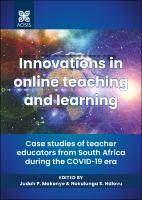Innovations in online teaching and learning
Case studies of teacher educators from South Africa during the COVID-19 era
Author(s)
Moll, Ian
Aghardien, Najma Aghardien
Hoosen, Nazira
Na-Allah, Danbaba Magana
Nkambule, Thabisile
Martin, Colwyn
Pillay, Preya
Martin, Melanie
Nkomo, Sibhekinkosi A.
Phakathi, Nelisiwe
van Wyk, Mari
Moodley, Kimera
Mlotshwa, Handson F.
Ndlovu, Nokulunga S.
Nyandoro, Brian
Makonye, Judah P.
Adelabu, Folake M.
Makgato, Moses
Ramaligela, Sylvia M.
Dewa, Alton
van der Westhuizen, Belinda
Khoza, Samuel D.
Charamba, Erasmos
Nyatsanza, Tarsisio
Shandu-Omukunyi, Nonhlanhla
Prozesky, Maria
Contributor(s)
Makonye, Judah P. (editor)
Ndlovu, Nokulunga S. (editor)
Language
EnglishAbstract
This book’s research is on online pedagogical approaches devised by teacher educators and researchers to circumvent a face-to-face curriculum delivery during the COVID-19 pandemic. The challenge faced by educators was that they were uncertain of how to use digital technologies in teaching, learning and assessment productively. This book reports on case studies on teaching student teachers with technology in a way that advanced not only communication but also the cognitive growth of students in relation to disciplinary knowledge. The scholars from South African universities used both conceptual and empirical methodologies, mostly in qualitative set-ups. The scholarly contributions in this book are varied. They cover theoretical nuances for ICT use in education, considerations for the use of computers in the classroom, pedagogical thinking and pedagogical integration of ICTs in education, affordances of iPads in visible teaching and learning, supporting student cognition in Languages, Mathematics, Science, Engineering Graphics and Design with ICTs. The use of software applications such as GeoGebra and Excel in teaching and learning mathematics is researched, among others. The rich discussions that emerged from their research enable academics to learn from ‘others’ innovative moments that came as a result of pandemic pressure. The recommendations in this book can be used in blended learning beyond the COVID-19 era, as curriculum delivery methods are bound to change. The value of this book is that it reports on pedagogical innovations in using digital technologies in teacher education. Researchers have an opportunity to learn from this book how to deal with the tantalising teaching and learning problem of our time: How can the use of digital technology transform teaching and learning in general and teacher education in particular?
Keywords
Teacher education; digital technologies; online learning; sub-Saharan Africa; professional development; engage; exploreDOI
10.4102/aosis.2022.BK376ISBN
9781779952295, 9781779952295Publisher
AOSISPublisher website
https://books.aosis.co.za/index.php/obPublication date and place
Cape Town, 2022Imprint
AOSIS PublishingClassification
Education


 Download
Download